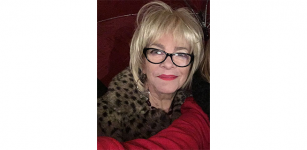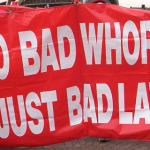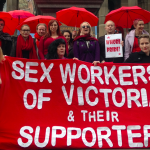Pioneer Sex Worker Rights Activist Awarded Order of Australia

The governor general, Sir Peter Cosgrove, announced 1007 awards in the Queen’s Birthday Honours list on Monday. And in an Australian first, a leading sex worker rights activist has been made an officer of the Order of Australia (AO).
Julie Bates has been at the forefront of the Australian sex worker rights movement for the last 35 years. And while today, the NSW sex industry is decriminalised, back when Ms Bates began mobilising, criminalised sex workers had no voice.
During the time of the pending HIV/AIDS crisis of the mid-80s, Ms Bates was promoting harm reduction strategies in the sex industry. And the success of her early work led her to become a consultant to the World Health Organisation.
The Queen’s Birthday Honours list outlines that 68-year-old Bates received the honour for her “distinguished service to community health, particularly through harm reduction programs,” peer support and empowerment initiatives for sex workers, people who use drugs, and those living with HIV/AIDS.
And after more than three decades of fighting to improve the lives marginalised people, the fact that Ms Bates has now been presented with one of the highest civilian awards in the country is a testament of how far community attitudes have changed.
Countless saved
Professor Basil Donovan, head of the Kirby Institute Sexual Health Program, put Ms Bates forward for the honour. The pair have collaborated on the 2007 Law and Sex Worker Health report, as well as last year’s follow up report.
On being asked what it was about Ms Bates’ work that led him to suggest she be awarded, he responded, “Put simply, in the context of the emerging AIDS epidemic, Julie Bates and a few close collaborators, established the health promotion model for sex workers.”
“She began in NSW,” he continued, “but, then she wrote the script for the World Health Organisation in the late 1980s.”
The professor also pointed out that Ms Bates has worked “tirelessly” in promoting the decriminalisation of the sex industry around Australia and the region. The decriminalisation models that have been established in NSW and New Zealand are now lauded globally.
In 1995, the Disorderly Houses Development Act was passed in NSW. The legislation decriminalised most aspects of the sex industry. The reforms reduced police corruption, improved sex worker health and safety, and increased access to peer support and education.
“Julie is smart, compassionate, and tenacious,” Professor Donovan told Sydney Criminal Lawyers®. “We will never know how many lives were saved through her work.”
Reducing the harms
A turning point for sex workers in Australia came in the mid-1980s, when Ms Bates convinced the owner of the Nevada brothel in Kings Cross to become the first establishment to openly take the health of Sydney sex workers into account and support the use condoms.
And in 1986, she became the first in-house manager of the Australian Prostitutes Collective NSW. The fact that the collective received government funding was a significant step in the promotion of sex worker rights nationwide.
The collective eventually morphed into the Sex Workers Outreach Project (SWOP), which is the longest running continuously funded peer-based sex worker organisation in the world. These days, Ms Bates remains an adviser to SWOP.
Ms Bates was an integral part of a national partnership of sex worker groups that successfully bid for government funding to hold a national conference known as the Sex Industry & the AIDS debate 88 that gave birth the following year to the Scarlet Alliance: the national sex worker organisation.
She has also played a pivotal role in the field of harm reduction for people who use drugs. She was made the first manager of the NSW Users and AIDS Association (NUAA) in 1989. And these days, Bates is a founding member and patron of Harm Reduction Australia.
In the service of others
“For much of my adult life I have been engaged in social justice advocacy and activism, and by definition, fighting for legislative protections for the most vulnerable and marginalised among us,” Ms Bates said.
The long-term social activist further explained that her work has been geared towards law reform, labour rights and anti-discrimination protections for “sex workers and other marginalised and criminalised people.”
Ms Bates began work as a law clerk in a Melbourne criminal law firm. In the mid-70s, she was taking evidence from complainants for the Victorian Beach Inquiry into “crooked cops.” And in 1984, she gave evidence at the NSW Rogan inquiry that recommended the decriminalisation of sex work.
Today, as principal of Urban Realists Planning, Julie remains a lobbyist for the decriminalisation of sex work and anti-discrimination protection, as well as supporting proponents for development approval of sex services premises, aka brothels, via their local council.
And she’s also an avid supporter of ending the war on drugs, which, as far as she’s concerned, amounts to a deadly persecution of people who use drugs.
Similar recognition across the ditch
But, Ms Bates is not the only sex worker rights activist to be recognised amongst her nation’s highest honours. Last week, her long term colleague New Zealand Prostitutes Collective co-founder Catherine Healy was made a Dame Companion of the New Zealand Order of Merit.
Ms Healy has been campaigning for sex worker rights for the last 30 years. And her collective was instrumental in the long campaign to decriminalise the sex industry in her country. The passing of the Prostitution Reform Act in 2003 saw the industry effectively decriminalised nationwide.
And while some in Australia and NZ raised objections over their acceptance of an honour from the Queen, the majority have shown overwhelming support for these two champions of social justice and the deserving recognition of their long term efforts to improve the lot of sex workers.
The fight continues
Ms Bates is delighted that this recognition has come her way, however, she makes clear that “there’s still unfinished business to attend to.” She points to the dire need for anti-discrimination protections for sex workers to be enacted in this country.
“I am hopeful this great honour, which I take as respecting sex work as work and sex workers as deserving of equality under the law and in society, will open more doors to these important endeavours that I will continue to devote myself to for the rest of my life,” Ms Bates concluded.







